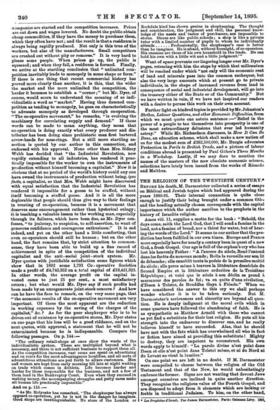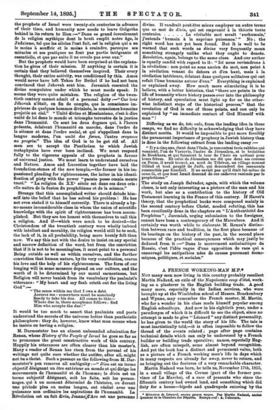THE RELIGION OF THE TWENTIETH CENTURY.* BEFORE his death, M.
Darmesteter collected a series of essays on Biblical and Jewish topics which had appeared during the years 1880-91. Their internal connection is quite close enough to justify their being brought under a common title, and the heading actually chosen corresponds with the capital importance which the author ascribes to the prophets in the history of Israelite religion.
Amos viii. 11, supplies a motto for the book : "Behold, the days come, saith the Lord God, that I will send a famine in the land, not a famine of bread, nor a thirst for water, but of hear- ing the words of the Lord." It seems to our author that the pre- diction has been fulfilled in our own times. Europe and France more especially have for nearly a century been in quest of a new God, a fresh Gospel. Our age is full of the orphan's cry who has lost his heavenly Father : " A l'aurore du siecle, Rene l'entend dans lea forets du nouveau monde ; Rolla la recueille stir son lit de debauche; elle ennoblit toute la poesie de la premiere moitie du siecle; elle perce meme a travers la litterature dessechee du Second Empire et la litterature orduriere de la Troisieme Republique ; et voici que le siecle a son declin se prend murmurer des paroles de foi ; va en quete d'une revelation, d'Ibsen a Tolstot, de Bouddha Gaya a Fiesole." When we have considered the answer to this cry we shall perhaps wonder whether it is to be taken seriously. But M. Darmesteter's seriousness and sincerity are beyond all ques- tion. He is deeply indignant at the moral evils which in some quarters have followed the abandoning of faith. He is as sympathetic as Matthew Arnold with those who cannot as yet find a substitute for their lost religion. He puts all his strength into the endeavour to discover one, and he really believes himself to have succeeded. Alas, that he should have met with the fate which has overwhelmed all who in fact or fiction have aimed at providing this substitute ! Mighty to destroy, they are impotent to reconstruct. His own words apply to himself : "La parole divine n'est point dans Ibsen et elle n'est point dans Tolstoi meme, et ni du Nord ni du Levant ne vient la lumiere."
On one point we are left in no doubt. If M. Darmesteter were compelled to choose between the religion of the Old Testament and that of the New, he would unhesitatingly embrace the former. Signs are not wanting that devout Jews amongst ourselves are inclined in quite another direction. They recognise the religious value of the Fourth Gospel, and are disposed to adopt from it elements which are lacking or feeble in traditional Judaism. To him, on the other hand,
Les Prophites cFIsrael. Par James Darmesteter. Paris: Calmama lAvy. 1895.
the prophets of Israel were twenty-six centuries in advance of their time, and humanity now needs to leave Golgotha behind in its return to Zion :—" Dans ce grand ecroulement
de la religion mythique dont le bruit emplit notre age, le Judaisme, tel que les siecles l'ont fait, est la religion qui a en le moires ii souffrir et le moires a craindre, parceque sea miracles et sea pratiques ne font pas partie integrante et essentielle, et que par suite it ne croule pas avec ens."
But the prophets would have been surprised at the explana- tion he gives of their mission. If anything is certain it is certain that they believed themselves inspired. Their every thought, their entire activity, was conditioned by this. Amos would never have left Tekoa for Bethel if he had not been convinced that Jehovah sent him. Jeremiah resented the divine compulsion under which he must needs speak. It seems they were quite mistaken. The religion of the twen- tieth century cannot admit of a personal deity :—" Car leur Jehovah n'etait, en fin de compte, que la conscience im- perieuse de quelques hommea divinisee, In conscience humaine projetee an ciel." "Unite divine et Measianisme, c'est-h-dire unite de loi dans le monde et triomphe terrestre de In justice dans l'humanite. Ce sont les deux dogmes qui, it l'heure presente, eclairent l'humanite en marche, dans l'ordre de la science et dans l'ordre social, et qui s'appellent dana la longue moderne, l'un unite des forces, l'autre erayance au progres." The idea of God is to be got rid of. All men are to accept the Pantheism to which Jewish metaphysics have ever been inclined. We must respond fully to the vigorous appeals of the prophets in favour of universal justice. We must learn to understand ourselves and Nature. Amos and Lucretius together have laid the foundation-stones of the new temple,—the former in his im- passioned pleading for righteousness, the latter in his identi- fication of piety with the power " pacata posse (amnia mente tueri." "La religion du XX' siecle est dans ces deux cris : elle naitra de la fusion du prophetisme et de la science."
Strange that this accomplished writer should delude him- self into the belief that he has solved his problem ! He has not even stated it to himself correctly. There is already a by- no-means inconsiderable class in whom the union of scientific knowledge with the spirit of righteousness has been accom- plished. But they are too honest with themselves to call this a religion. And if—which were much to be desired—the Christendom of the twentieth century were wholly imbued with intellect and morality, its religion would still be to seek, the lack of it, in all probability, being more keenly felt than now. We say this not with the desire to insist on any special and narrow definition of the word, but from the conviction that if it is not to be meaningless, it must point to a personal Being outside as well as within ourselves, and the further conviction that human nature, by its very constitution, craves his love and the help of his righteousness. The form of our longing will in some measure depend on our culture, and the worth of it be determined by our moral earnestness, but Religion will never banish from its vocabulary the psalmist's utterance : " My heart and my flesh crieth out for the living God ":—
" The sense within me that I owe a debt Assures me–somewhere must be somebody
Ready to take his due. All comes to this—
Where due is, there acceptance follows : find Him who accepts the due !"
It would be too much to assert that psalmists and poets understand the secrets of the universe better than pantheistic philosophers : they do, however, know what man means when he insists on having a religion.
M. Darmesteter has an almost unbounded admiration for Renan, whose History of the People of Israel he goes so far as to pronounce the great constructive work of this century. Happily his utterances are often clearer than his master's. Many a reader of Renan has risen from the perusal of his writings not quite sure whether the autffor, after all, might not be a theist. Such a passage as the following from M. Dar- mesteter's pen removes all ambiguity :—" Dieu eat tin terme objectif designa.nt un etre exterieur au monde et qui dirige les mouvements de l'humanite et de l'homme; le divin est un terme subjectif designant, soit les faits, soit les person- nages, qui is un moment determine de l'histoire, ou durant tine periode plus on moires longue, out realise avec une puissance non ordinaire les aspirations de l'humanite. La Revolution est un fait divin, Jeanne:d'Arc est une personne divine. 11 vaudrait peut•etre mieux employer un entre terme que ce mot de divin, qui est emprunte it la theorie touts contraire Le veritable mot seralt 'surhumain,' j'entends hnmain is la supreme puissance.' " No ; the
right word has not yet been found. But it is well to be warned that such words as divine very frequently mean something strangely unlike what they ought to denote. Revelation, again, belongs to the same class. And our author is equally candid with regard to it : " Ici nous reviendrons it la revelation: non point au sens ancien dri mot, non point it
In revelation venant du dehors et d'en hant, mais it la revelation interieure, eclatant dans quelques solitaires qui ont refait rime humaine autour d'eux." Everything is explained or explained away. How much more stimulating it is to believe, with a better historian, that "there are points in the life of humanity where history passes over into the philosophy of history, and speculation must light up for us the other- wise indistinct steps of the historical process," that the revelation of God is one of those points, and can only be explained by " an immediate contact of God Himself with man " !
Differing as we do, toto ccelo, from the leading idea in these essays, we find no difficulty in acknowledging that they have distinct merits. It would be impossible to put more forcibly the paramount importance of prophecy in Jewish history than is done in the following extract from the leading essay :-
" Il y a cinq ans, etant dans 1'Inde, je rencontrai trois rabbins qui venaient, l'un de Varsovie, l'autre de Jerusalem, et le troisieme de Boukhara, et qui faisaient le tour de 1'Asie en quetant pour leurs freres. Et celui de Jerusalem me dit que dana sea courses en Perse, it avait trouve, au nord de Teheran, un village nomme Gilead et tout , peuple de Tuffs, qui descendent des ossements ressuscites par Ezechiel. Il ne savait pas qu'il etait lui-rueme de ceux-la, et que tout Israel descend de ces cadavres ranimes par le prophetisme."
The study on Joseph Salvador, again, with which the volume closes, is not only interesting as a picture of the man and hie work, but also as a contribution to the history of Old Testament learning in the France of this century. If Havet's theory, that the prophetical books were composed mainly in the second century before Christ, needed refuting, this has been excellently done in the chapters on " L'Inthenticite des Prophetes " ; Jeremiah, urging submission to the foreigner, cannot have been a contemporary of the Maccabees. And it certainly was worth while to elaborate M. Renan's distinc- tion between race and tradition, in the first place because of its bearings on the history of the past, in the second place because of the practical consequences which may justly be deduced from it :—" Dans le mouvement antisemitique de Russie, c'est l'idee vague d'une opposition de race qui a ensanvage les antipathies nees de causes purement &ono- miques, politiques, et sociales."



































 Previous page
Previous page